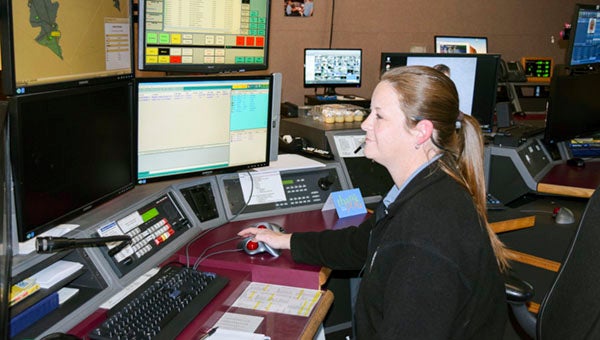Dispatcher, counselor, lifesaver? All of the above
Published 10:23 am Friday, April 22, 2016

Franklin Police Department Dispatcher Amy Justus looking at the map to see where the caller is located at. — Rebecca Chappell | Tidewater News
FRANKLIN
The telecommunications personnel in the public safety setting were honored throughout the country for their service, in what has become known as National Public Safety Telecommunications Week (April 10-16). During that time, several local dispatchers had the opportunity to explain just what it’s like to be in this position, and how their job has several characteristics and tasks that the pubic eye may or may not realize.
“We’re not just dispatchers,” Amy Justus said. “We’re a friend, a counselor, technical support and help the offices out as much as we can, in any way that we can.”
Justus is a dispatcher at the Franklin Police Department and has been in the position for going on 17 years. She said that every day is different, and every call is different and she never knows what’s going to happen when she picks up the call.
“I’ve been here so long, it [being in the mindset of a dispatcher] comes so natural. I don’t get scared on calls, but I do get uneasy on some and get scared for the officers. You get the feeling that something is going to happen,” Justus added.
She said that although she loves her job and she loves helping people, sometimes it can be overwhelming and extremely frustrating.
“It’s hard at peak times and there’s not enough personnel and we are trying to meet all the needs,” Justus said. “It’s also frustrating when someone gives us the wrong information. But, the worst thing is, is when we get a call from a disconnected cell phone. A lot of them are accidental calls, but it’s the law for the phones to have the capability to call us even when it’s disconnected.”
She said that they receive a lot of accidental 911 calls and most people’s first instinct is to hang up. However, the correct thing to do is to stay on the line and when the dispatcher picks up, just tell them you didn’t mean the call. If it really is an emergency, the most important thing to tell the dispatcher is your location.
Public safety telecommunications personnel also face several other challenges and hardships throughout the course of their work day.
“Most people don’t realize how many calls we get. Sometimes we will get 50 calls in 10 minutes. We don’t just take police, fire and rescue calls,” Justus said.

Dispatcher Shana Council listens to callers and type up information to relay to officers. — Rebecca Chappell | Tidewater News
Shana Council, another dispatcher at the Franklin Police Department, added, ‘It’s frustrating when citizens don’t think we’re taking care of them, or when we don’t get the correct information and people don’t realize how much they [emergency personnel and citizens] count on us.”
Often when a citizen calls in, they will give the wrong phone number, the wrong address, the wrong name and several other things. When this happens, it puts the officers in danger and puts this dispatchers in an extremely difficult position. If the dispatchers don’t have the right information, they can’t help in the way that they need and want to.
“We have to stay professional all the time, through everything,” Justus continued. “Minor things may be the ‘emergency,’ but it’s those minor things are the most important to the caller. It is a real emergency for them, and we send an officer to help.”
Kay Halverson, another dispatcher, added, “The first time the caller thinks they hear sarcasm, it messes everything up. We may have been on the phone for two hours, but it will all be over with if we aren’t professional. If they get upset with us, they won’t be able to help us in the way we need or want to.”
Council added that even if they are outside of work, they have to be professional because they represent the whole department and one bad thing can make the department not be trusted.
Everything they deal with, they take home with them and deal with it in their own way.
“Being a dispatcher, you know what you have to do and you’re not helping anyone if you lose it,” Justus said.
Council said, “A lot of people de-stress on the way home from work, when they are in their car and by themselves.”
However, dispatchers are always taking classes and learning more on how to deal with certain calls, how to handle certain people and everything else they face.
“We are constantly taking classes and tests,” Justus said. “When we have the opportunity to take classes we take them, but a lot of it [what to do and how to handle situations] comes naturally.”
Although dispatching is an under-appreciated job, those in the career stay with it because they love what they do and they love helping others.
The Franklin City Council summarized everything dispatchers do best in the proclamation they drew up regarding National Public Safety Telecommunications Week.
“Whereas emergencies can occur at any time that require police, fire or emergency medical services; and, whereas when an emergency occurs the prompt response of police officers, firefighters and paramedics is critical to the protection of life and preservation of property; and, whereas the safety of our police officers and firefighters is dependent upon the quality and accuracy of information obtained from citizens who telephone the City of Franklin police-fire-ems communications center; and, whereas Public Safety Telecommunicators are the first and most critical contact our citizens have with emergency services; and, where Public Safety Telecommunicators are the single vital link for our police officers, emergency medical technicians and firefighters by monitoring their activities by radio, providing them information and insuring their safety; and whereas Public Safety Telecommunicators of the City of Franklin have contributed substantially to the apprehension of criminals, suppression of fires and treatment of patients; and, whereas each dispatcher has exhibited compassion, understanding and professionalism during the performance of their job in the past year.”





